
| Version | Summary | Created by | Modification | Content Size | Created at | Operation |
|---|---|---|---|---|---|---|
| 1 | OURANIA Tzoraki | + 2258 word(s) | 2258 | 2021-07-05 08:18:33 | | | |
| 2 | Beatrix Zheng | Meta information modification | 2258 | 2021-07-19 13:42:07 | | |
Video Upload Options
The ongoing ‘refugee crisis’ of the past years has led to the migration of refugee researchers (RRs) to European countries. Due to the COVID-19 pandemic, RRs often had to work from home and/or to continue their social, cultural and economic integration process under new conditions. An online survey carried out to explore the impact of the pandemic on the refugee researchers showed that RRs found it difficult to adapt their everyday working life to the ‘home’ setting. The majority have had neither a suitable work environment at home nor the appropriate technology. Although they stated that they are rather pleased with the measures taken by the public authorities, they expressed concern about their vulnerability due to their precarious contracts and the bureaucratic asylum procedures, as the pandemic has had a negative impact on these major issues. The majority of RRs working in academia seem not to have been affected at all as far as their income is concerned, while the majority of those employed in other sectors became unemployed during the pandemic (58%). Recommendations are provided to the public authorities and policy makers to assist RRs to mitigate the consequences of the pandemic on their life.
1. Introduction
The outbreak of the Coronavirus disease COVID-19 has affected all the countries of the world, with 147 million infected and 3.1 million dead at the end of April 2021 [1]. Facing limited preparedness to control the spread of the virus, various governments adopted several public health strategies. The applied measures include enforcing complete or partial restrictions to financial and social activities, the so called “lockdowns”, restricting international travel, social distancing and the adoption of hygiene practices (masking, hand disinfection) [2]. Academic events such as conferences and meetings have been taking place online. Schools and universities closed and started to give classes online. Business activity was restricted.
The COVID-19 pandemic has affected significant aspects of economic and social life, forcing millions of people to working from home (WFH) [3]. Since the start of the pandemic, almost 85% of knowledge workers in Europe made a shift to the WFH practice [4], even though they used to spend more than 80% of their working time in a central office environment [5].
At the same time, Europe faced the so called “refugee crisis”, with 2.2 million arrivals in the period 2014–2020 in the South European countries and Germany to host almost half of the asylum seekers reaching Europe [6]. Scientists with academic and specialized knowledge (refugee researchers—RRs) who have left their country, seeking a safer life, have been trying to integrate into their host countries and continue their research careers[7][8].
RRs are a vulnerable part of the refugee community (very often waiting for asylum procedures to end). Due to the precarious nature of their research funding, they are strongly dependent on short-term scholarships or research grants that may have been expired during the pandemic, and many are without any financial support for their research, for instance, as they have been waiting for research funding applications to be evaluated. Moreover, RRs employed in industry or in the private sector are potentially in a more vulnerable position due to their generally less stable employment conditions and lower seniority on the job.
2. Analysis on Refugee Researchers' Status During COVID-19 Pandemic
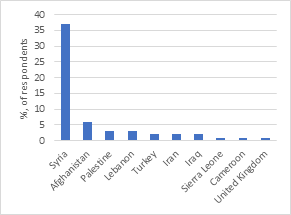 (a)
(a)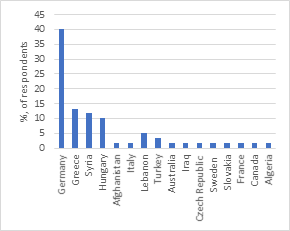 (b)
(b)Figure 1. (a) Origin country of refugee researchers (RRs); (b) host country of RRs.
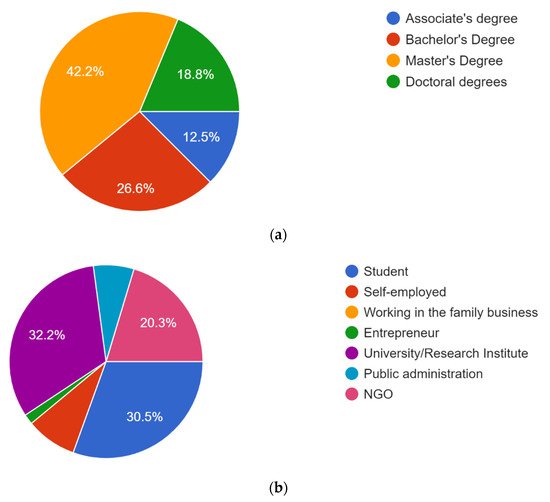
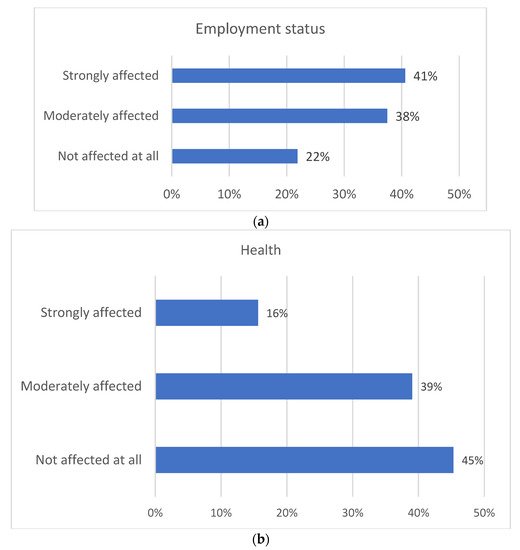
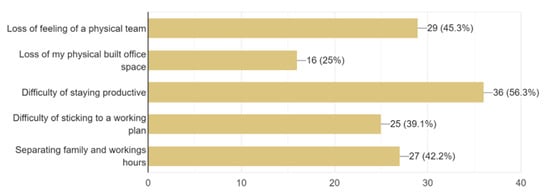
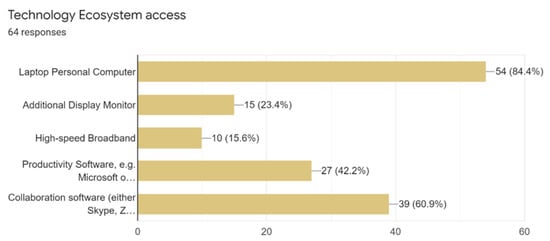
3. Conclusions
References
- COVID-19 Google News . Coronovirus (COVID-19). Retrieved 2021-7-17
- Edlaine Faria De Moura Villela; Rossana Verónica Mendoza López; Ana Paula Sayuri Sato; Fábio Morato de Oliveira; Eliseu Alves Waldman; Rafael Van Den Bergh; Joseph Nelson Siewe Fodjo; Robert Colebunders; COVID-19 outbreak in Brazil: adherence to national preventive measures and impact on people’s lives, an online survey. BMC Public Health 2021, 21, 1-10, 10.1186/s12889-021-10222-z.
- Melanie Arntz; Sarra Ben Yahmed; Francesco Berlingieri; Working from Home and COVID-19: The Chances and Risks for Gender Gaps. Intereconomics 2020, 55, 381-386, 10.1007/s10272-020-0938-5.
- Jamie Kelly; The New "Covid-19" Home Office Worker: Evolving Computer-Human Interactions and the Perceived Value of Workplace Technology. Technium Social Sciences Journal 2020, 13, 575-581, 10.47577/tssj.v13i1.1797.
- Adapting to Technological and Societal Disruption. Science, Technology and Innovation Outlook Report; 2018. . OECD. Retrieved 2021-7-17
- Meditteranean Situation - 2021 . UNHCR Operational Portal. Retrieved 2021-7-17
- Tzoraki O., Lagou M., Gavalas V., Petracou E., Siarkos I., Di Pasquale E. ists Trapped in Volume 15, number 1, 50-68, ISSN 1843 – 5610; Educational Profile of Refugee Scientists Waiting Asylum Demanding Procedures in Greece. Journal of Identity and Migration Studies 2021, 15, 50.
- Tzoraki Ourania; A Descriptive Study of the Schooling and Higher Education Reforms in Response to the Refugees’ Influx into Greece. Social Sciences 2019, 8, 72, 10.3390/socsci8030072.
- Korbel, J.O.; Stegle, O. Effects of the COVID-19 pandemic on life scientists. Genome Biol. 2020, 21, 1–5.
- Aczel, B.; Kovacs, M.; van der Lippe, T.; Szaszi, B. Researchers working from home: Benefits and challenges. PLoS ONE 2021, 16, e0249127.
- Zubașcu, F. Marie Curie Researchers ‘Betrayed’ by Commission’s Refusal to Extend Costs. Sci.|Bus. J. 2020. Available online: (accessed on 23 March 2021).
- Cimpoeru, S.; Roman, M.; Kobeissi, A.; Mohammad, H. How are European Migrants from the MENA Countries Affected by COVID-19? Insights from an Online Survey. J. Soc. Econ. Stat. 2020, 9, 128–143.
- König, M.; Winkler, A. COVID-19 and Economic Growth: Does Good Government Performance Pay Off? Intereconomics 2020, 55, 224–231.
- Witteveen, D.; Velthorst, E. Economic hardship and mental health complaints during COVID-19. Proc. Natl. Acad. Sci. USA 2020, 117, 27277–27284.
- Arntz, M.; Ben Yahmed, S.; Berlingieri, F. Working from Home and COVID-19: The Chances and Risks for Gender Gaps. Intereconomics 2020, 55, 381–386.
- Irlacher, M.; Koch, M. Working from Home, Wages, and Regional Inequality in the Light of COVID-19. Jahrbücher für Nationalökonomie und Statistik 2021, 241, 373–404.
- Cassidy, K. Solidarity in Pandemic Times: Asylum Seekers in Forced Accommodation during COVID-19. Fuse: Centre for Translational Research in Public Health COVID-19. Semin. Ser. 2020. Available online: (accessed on 26 June 2021).
- Ipsen, C.; van Veldhoven, M.; Kirchner, K.; Hansen, J.P. Six Key Advantages and Disadvantages of Working from Home in Europe during COVID-19. Int. J. Environ. Res. Public Health 2021, 18, 1826.
- EASO. COVID-19 Emergency Measures in Asylum and Reception Systems, Public—Issue No. 3, 41 pages, 7 December 2020. 2020. Available online: (accessed on 26 June 2021).
- Elisabeth, M.; Maneesh, P.-S.; Michael, S. Refugees in Sweden During the Covid-19 Pandemic—The Need for a New Perspective on Health and Integration. Front. Public Health 2020, 8, 574334.
- Doliwa-Klepacka, A.; Zdanowicz, M. The European Union Current Asylum Policy: Selected Problems in the Shadow of COVID-19. Int. J. Semiot. Law Rev. Int. Sémiotique Jurid. 2020, 1–17.
- Kowal, M.; Sorokowski, P.; Sorokowska, A.; Lebuda, I.; Groyecka-Bernard, A.; Białek, M.; Kowalska, K.; Wojtycka, L.; Olszewska, A.M.; Karwowski, M. Dread in Academia—How COVID-19 affects science and scientists. Anthropol. Rev. 2020, 83, 387–394.
- Pinzón-Espinosa, J.; Valdés-Florido, M.J.; Riboldi, I.; Baysak, E.; Vieta, E. The COVID-19 Pandemic and Mental Health of Refugees, Asylum Seekers, and Migrants. J. Affect. Disord. 2021, 280, 407–408.
- Biddle, L.; Jahn, R.; Perplies, C.; Gold, A.W.; Rast, E.; Spura, A.; Bozorgmehr, K. COVID-19 in collective accommodation centres for refugees: Assessment of pandemic control measures and priorities from the perspective of authorities. Bundesgesundheitsblatt Gesundh. Gesundh. 2021, 64, 342–352.
- Betcherman, G.; Giannakopoulos, N.; Laliotis, I.; Pantelaiou, I.; Testaverde, M.; Tzimas, G. Reacting Quickly and Protecting Jobs: The Short-Term Impacts of the COVID-19 Lockdown on the Greek Labor Market; Global Labor Organization (GLO): Essen, Germany, 2020.
- Gallè, F.; Sabella, E.A.; Ferracuti, S.; De Giglio, O.; Caggiano, G.; Protano, C.; Valeriani, F.; Parisi, E.A.; Valerio, G.; Liguori, G.; et al. Sedentary Behaviors and Physical Activity of Italian Undergraduate Students during Lockdown at the Time of COVID−19 Pandemic. Int. J. Environ. Res. Public Health 2020, 17, 6171.
- Blom, V.; Lönn, A.; Ekblom, B.; Kallings, L.V.; Väisänen, D.; Hemmingsson, E.; Andersson, G.; Wallin, P.; Stenling, A.; Ekblom, Ö.; et al. Lifestyle Habits and Mental Health in Light of the Two COVID-19 Pandemic Waves in Sweden, 2020. Int. J. Environ. Res. Public Health 2021, 18, 3313.
- Byrom, N. COVID-19 and the Research Community: The Challenges of Lockdown for Early-Career Researchers. eLife J. 2020. Available online: (accessed on 26 June 2021).
- Byrom, N.; Metcalfe, J. Impact of COVID 19 on Doctoral and Early Career Researchers. Figshare Dataset 2020. Available online: (accessed on 26 June 2021).
- Abbasi-Shavazi, M.J. COVID-19, economic recession, and the Refugee situation. Int. Migr. 2021, 59, 289–292.
- EURAXESS. Science4Refugees—Welcome Refugee Researchers and Students Looking for a Suitable Job! 2021. Available online: (accessed on 23 March 2021).
- BRIDGE II. 2021. Available online: (accessed on 17 March 2021).





